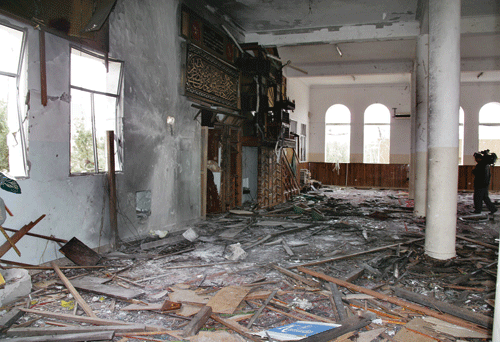The attack on Yemeni President Ali Abdullah Saleh while he and his cabinet were at Friday prayers last month turned Yemen on its head. The days before the attack saw heavy clashes between rival tribes in the capital of Sanaa and civil war seemed inevitable. It became clear that the potential price of overthrowing the regime would be much greater than it had been in Egypt or Tunisia.
Then came the June 3 ambush, leaving Saleh with burns to 40 percent of his body and injuries to his neck and chest requiring surgery; a dozen members of his cabinet were also heavily injured, some losing limbs. Several days later Saleh and most of his cabinet evacuated to Saudi Arabia, setting the stage for controversy. The youth in the “squares of change” around Yemen took to the streets at midnight to celebrate what was to them the final exit of Saleh’s regime, analogous to that of former Tunisian President Zine el-Abidine Ben Ali.
In many quarters, however, the celebrations were criticized as a glorification of violence and comparable to Saleh’s own savagery. Some were dismayed that the peaceful nature of the youth uprisings had descended into violence. And more importantly, the sanctity of where he was attacked garnered sympathy for the wounded despot; religion is a fundamental building block of the Yemeni DNA, and the timing and location of the attack blighted its outcome.
The youth in the squares were naturally defensive in response. Saleh’s departure, they said, had been the goal for months and the means should not be questioned, even if it was not they who performed the operation. There were accusations of hypocrisy against those who condemned the attack on Saleh but not the violence Saleh had wrought on peaceful protesters leaving hundreds dead. One Yemeni youth justified the mosque attack by saying he “was going to leave prayer to kill more of us.”
Under the headline, “God’s hand that devastated Al Nahdeen Mosque”, Yemeni journalist Khaled Abdulhadi wrote in Al-Masdar: “The holiness of the mosque is meaningless if murderers were inside it; in fact it was meant by God that they were all inside to be attacked.”
Another casualty of the assault, however, may be Yemeni national reconciliation. In mid-June an unknown group called the “Revenge brigades of Yemen and President Saleh” attacked an opposition newspaper and pledged to assassinate opposition political leaders and Saleh opponents. These incidents raise concerns about the post-Saleh era. Unless a real national dialogue begins, and some sort of consensus emerges, blood will continue to stain Yemen’s headlines for years to come.
Five months of uprisings have made it clear that neither supporters of the regime nor the protest movement can easily impose their will on the other. Saleh’s departure presents an opportunity for the transfer of power, but this requires Yemen’s political actors to reach some form of national accord and opt for development over retribution, the former being crucial in a country where 40 percent of the population lives below the poverty line and the economy has lost some $5 billion since the beginning of the crisis, according to the Yemeni minister of trade and industry.
Such consensus needs to account for the country’s diversity and include groups from South Yemen (who pose the most serious political issue facing the country), the Houthis (who have lived through six wars in five years), tribal actors, the youth movement and the current ruling party. The Joint Meeting Parties (JMP), the main opposition group in the country, has called for the transition of power to the vice president, followed by the formation of a national unity government assembled by the current ruling party and the JMP. This interim government would then convene a national consensus conference to establish the framework for a cohesive and inclusive ruling body.
For this to be realized, foreign actors at the fore of the negotiations — such as the Gulf Cooperation Council, European Union and the United States — will also need to pressure the various local actors to partake. Paramount in all this, however, is that the protesters’ principal demand of the last five months is met; that Saleh and the rest of his family be removed from power.
This article was published on the Executive
You can opt to publish other people`s books if you like under your imprint the name of your resume services online publishing company.








